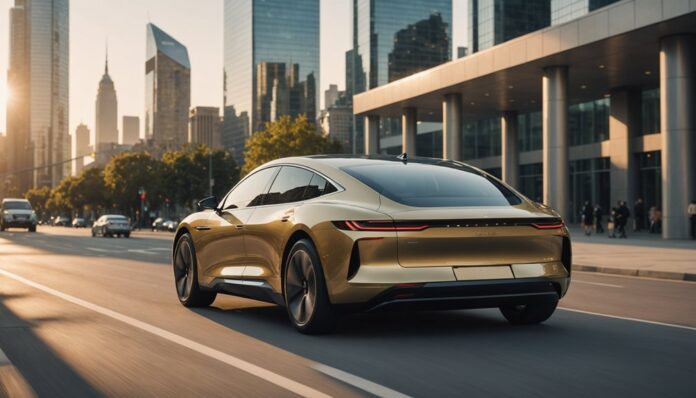Automakers are tackling the issue of battery life in new electric vehicle models through a multi-faceted approach. Advances in battery chemistry, thermal management systems, and the integration of solid-state batteries are among the key strategies being employed. As the demand for sustainable transportation solutions continues to grow, these innovations aim to improve efficiency, lifespan, and overall performance. The results are promising, but there’s more to investigate.
Highlights
- Automakers are enhancing battery chemistry and technology, adjusting material proportions, and incorporating novel components to improve performance and lifespan.
- Advances in thermal management systems prevent overheating, minimize heat transfer, and efficiently manage heat during charging and discharging.
- Solid-state batteries are being developed to offer improved safety, higher energy density, and reduced thermal runaway risks compared to lithium-ion batteries.
- Fast charging capabilities, wireless charging features, and smart charging systems are being prioritized to enhance user convenience and optimize energy transfer.
- Sophisticated battery algorithms and predictive maintenance are being developed to optimize charging and discharging patterns, detect anomalies, and minimize downtime.
Enhancing Battery Chemistry for Increased Efficiency
While the development of more efficient battery technologies has been a longstanding challenge, researchers have made considerable advancements in enhancing battery chemistry to increase overall efficiency.
Remarkably, improvements in battery composition have contributed significantly to these advancements. By adjusting the proportions of key materials and incorporating novel components, researchers have successfully increased battery performance and lifespan.
Additionally, electrolyte optimization has played an essential role in enhancing efficiency. Advances in electrolyte formulation have improved ionic conductivity and reduced internal resistance, allowing batteries to operate more efficiently.
These developments have collectively contributed to the creation of more efficient battery systems, clearing the path for widespread adoption in emerging applications.
Further research is expected to yield continued improvements in battery efficiency.
Advances in Thermal Management Systems
As researchers continue to expand the limits of battery technology, advances in thermal management systems have emerged as a vital factor in improving overall battery performance and lifespan.
Effective thermal management is essential in preventing overheating, which can greatly reduce battery lifespan. To address this issue, automakers are incorporating thermal insulation materials into battery designs to minimize heat transfer.
Additionally, engineers are developing innovative heat dissipation systems that efficiently dissipate heat generated during charging and discharging cycles. These advancements enable batteries to operate within ideal temperature ranges, resulting in improved efficiency, capacity, and lifespan.
The Role of Solid-State Batteries in Future EVs
Although lithium-ion batteries have dominated the electric vehicle market, researchers are increasingly focused on solid-state batteries as a promising alternative for future EVs.
Solid-state batteries offer several advantages, including improved safety, higher energy density, and faster charging times. By replacing the liquid electrolyte in lithium-ion batteries with a solid material, solid-state batteries reduce the risk of thermal runaway and explosions.
This design also enables the use of more energy-dense materials, potentially increasing driving ranges and reducing battery size. Future applications of solid-state batteries in EVs are promising, with several manufacturers already investing in their development.
As research and development continue to advance, solid-state batteries may become a key component in the next generation of electric vehicles, offering improved performance, safety, and efficiency.
Improving Charging Speed and Convenience
Given the importance of minimizing downtime and maximizing usability, manufacturers are prioritizing improvements in charging speed and convenience for new electric vehicle models.
To address this need, many automakers are integrating fast charging capabilities into their vehicles, enabling drivers to quickly recharge on the go. Advances in charging technology have also led to the development of more efficient charging systems, which can replenish batteries to 80% in under 30 minutes.
User convenience is also being enhanced through the implementation of features like wireless charging and smart charging systems, which optimize energy transfer based on factors like grid demand and renewable energy availability.
Optimizing Battery Design for Better Performance
Battery design plays an essential role in determining the overall performance and efficiency of electric vehicles. Consequently, automakers are investing heavily in design innovation to optimize battery structure and improve overall performance.
Advances in battery design have enabled the creation of more efficient, compact, and lightweight batteries. These advancements have been achieved through the development of new battery frameworks, such as modular and solid-state designs. By improving battery design, automakers can increase energy density, reduce charging times, and enhance overall driving range.
Additionally, optimized battery design also enables more efficient thermal management, which is critical for maintaining battery health and prolonging lifespan. By prioritizing design innovation, automakers aim to deliver electric vehicles that are more efficient, reliable, and desirable to consumers.
The Impact of Regenerative Braking on Battery Life
Building on the advancements in battery design, another key factor influencing battery life is regenerative braking. This technology utilizes kinetic energy and converts it into electrical energy, which is then stored in the battery.
By optimizing regenerative efficiency, automakers can greatly improve energy recovery, resulting in longer battery life and increased overall efficiency. Regenerative braking systems capture energy that would otherwise be lost as heat during braking, reducing wear on brake pads and rotors.
As a result, vehicles equipped with advanced regenerative braking systems can achieve improved fuel economy, reduced emissions, and enhanced overall performance. By integrating regenerative braking with advanced battery design, automakers can create more efficient and sustainable vehicles that benefit both drivers and the environment.
Using Advanced Materials for Battery Construction
Significant breakthroughs in material science have led to the development of advanced materials for battery construction, enabling the creation of more efficient, durable, and cost-effective batteries.
Automakers are increasingly utilizing lightweight materials, such as lithium aluminum and carbon fiber, to reduce battery weight while maintaining energy density.
Additionally, the integration of nano coating technology has improved battery electrode performance, resulting in faster charging times and increased overall lifespan.
These advancements have also led to the development of more compact battery designs, allowing for greater flexibility in vehicle design and improved overall efficiency.
Implementing Smart Charging and Energy Management
As the development of advanced materials continues to enhance battery performance, automakers are also focusing on optimizing the charging and energy management systems in their electric vehicles.
Implementing smart charging systems enables vehicles to regulate the flow of energy more efficiently, reducing wear on batteries and improving overall performance.
Energy management systems also play an essential role in optimizing battery life by ensuring that energy is distributed effectively throughout the vehicle.
By combining smart charging and energy management, automakers can greatly improve the efficiency and lifespan of electric vehicle batteries.
This integrated approach allows for real-time monitoring and adjustment of energy usage, ensuring that drivers get the most out of their electric vehicles.
The Benefits of Lithium-Air Batteries in Electric Vehicles
The pursuit of more efficient and sustainable battery technologies has led researchers to investigate the potential of lithium-air batteries for electric vehicles.
Lithium-air batteries, also known as lithium-oxygen batteries, offer several advantages over traditional lithium-ion batteries. They have the potential to considerably increase energy density, reduce weight, and improve overall efficiency.
The air technology used in these batteries allows for a more efficient exchange of oxygen, which enhances the battery’s performance and lifespan. As a result, lithium-air batteries could potentially double or even triple the driving range of electric vehicles, making them a more viable option for long-distance travel.
The development of lithium-air batteries is still in its early stages, but it holds great promise for the future of electric vehicles.
Software Solutions for Extending Battery Longevity
Building on the advancements in battery technologies, such as lithium-air batteries, researchers are also focusing on software solutions to extend battery longevity.
By developing sophisticated battery algorithms, manufacturers can optimize charging and discharging patterns to reduce wear and tear on the battery. These algorithms can also detect anomalies and predict potential issues, enabling predictive maintenance and minimizing downtime.
Moreover, advanced software can provide personalized recommendations to drivers on how to extend battery life based on their driving habits and conditions.
By leveraging these software solutions, automakers can greatly enhance the overall efficiency and lifespan of electric vehicle batteries, providing drivers with a more reliable and sustainable driving experience.
Predictive maintenance and optimized battery management are key to releasing the full potential of electric vehicles.
Conclusion
Automakers are making important progress in improving battery life in new electric vehicle models. By leveraging advanced technologies, including enhanced battery chemistry, thermal management systems, and solid-state batteries, manufacturers are increasing efficiency and lifespan. Additionally, innovations in charging speed, battery design, and energy management are contributing to more sustainable transportation solutions. These advancements are ready to play a vital role in meeting the growing demand for environmentally friendly vehicles.


